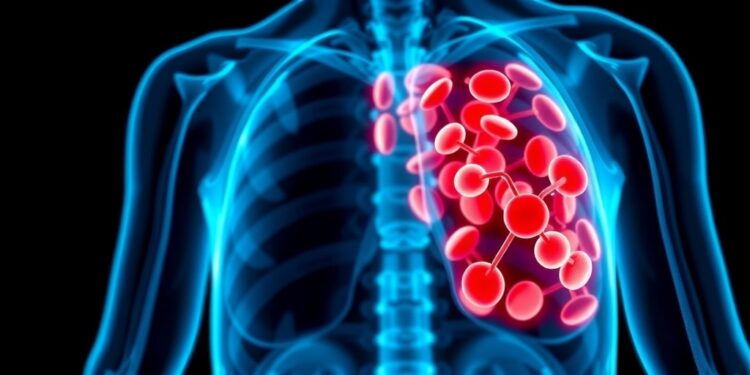Patients diagnosed with active cancer face numerous health challenges, among which the development of blood clots, or venous thromboembolism (VTE), poses a significant risk. The recent findings from the API-CAT trial shed light on an effective treatment strategy for these patients, suggesting that a lower dosage of apixaban may provide similar benefits to full-dose anticoagulant therapy while minimizing the risk of bleeding. The presentation of this study at the American College of Cardiology’s Annual Scientific Session (ACC.25) marks a critical advancement in the management of VTE in cancer patients.
Cancer is associated with a heightened risk of thromboembolic events, and VTE remains the second leading cause of mortality among cancer patients. The pathophysiology behind this phenomenon involves complex interactions between cancer biology, inflammatory responses, and the effects of cancer treatments. Tumor cells secrete pro-coagulant substances that induce a hypercoagulable state, leading to increased clot formation. Moreover, interventions such as surgery can further elevate VTE risk due to patient immobilization and vascular injury.
Current clinical guidelines advocate for an initial treatment course of anticoagulants for a minimum of six months for cancer patients who develop VTE. While this treatment duration initially reduces recurrence rates, studies indicate that patients remain vulnerable to subsequent thromboembolic events beyond the six-month mark. Unfortunately, the potential for increased bleeding risk associated with prolonged anticoagulation remains a significant concern, complicating the management of patients with cancer.
Isabelle Mahé, MD, PhD, the principal investigator of the API-CAT trial, acknowledged the uncertain landscape surrounding the optimal strategy for preventing VTE recurrence post six months of anticoagulation therapy. The trial was designed to address this knowledge gap, specifically evaluating whether a reduced-dose administration of apixaban—compared to the standard full dose—would provide similar efficacy in preventing VTE recurrence while concurrently reducing the incidence of bleeding complications.
Conducted as a rigorous randomized, international, double-blinded study, the API-CAT trial enrolled 1,766 patients across 11 countries. Among them, the cohort had an average age of 67, with a noteworthy representation of women at 57%. The majority of participants exhibited various forms of active cancer, including breast, colorectal, and prostate cancers, with a significant proportion undergoing concurrent cancer treatments. The study’s careful design ensured that patients had a minimum of six months of prior anticoagulant treatment before being assigned to either the reduced-dose or full-dose apixaban groups for the subsequent twelve months.
In a critical analysis of the study data, outcomes related to VTE recurrence were meticulously tracked. At the conclusion of the twelve-month follow-up, results demonstrated that the recurrence rate of VTE among patients receiving the reduced dose of apixaban was approximately 2.1%, compared to 2.8% in those receiving the full dose. This difference not only signifies the non-inferiority of the lower dosages but also points to its potential as a safe alternative for extended VTE management in cancer patients.
Additionally, the occurrence of clinically relevant bleeding, requiring medical intervention, was markedly lower in the reduced-dose group—12.1% compared to 15.6% in the full-dose group. This reduction underscores the clinical significance of adjusting anticoagulation therapy in this vulnerable population, as mitigating bleeding risks is a paramount concern in cancer patient management. Interestingly, the mortality rates were comparable between the two groups, suggesting that reducing the dose of apixaban does not compromise overall survival.
The implications of these findings are profound, potentially prompting a much-needed update to clinical practice guidelines concerning anticoagulation management in active cancer patients. As Mahé stated, the evidence gathered from the API-CAT trial positions the lower-dose apixaban as not only effective but also a safer recommendation over the traditional full dose, providing a dual benefit of reducing VTE recurrence while lowering bleeding risks.
Despite the promising outcomes, certain limitations inherent to the study must be addressed. Notably, there remains a lack of clarity regarding the optimal duration of anticoagulant therapy beyond the twelve-month period evaluated in the trial. Furthermore, the absence of data on racial and ethnic differences in treatment efficacy and safety leaves important questions unanswered. The exclusion of patients with brain tumors also means the findings may not be directly applicable to all cancer types, particularly those with specific bleeding risks associated with certain malignancies.
To further the understanding of VTE management in cancer patients, Mahé and her research colleagues intend to undertake follow-up analyses that consider various cancer types influenced by the differing anticoagulation strategies. Such investigations will play a pivotal role in refining treatment pathways and optimizing patient care.
In conclusion, the API-CAT trial contributes vital evidence towards shaping future pharmacological approaches in managing VTE amongst cancer patients. By establishing the efficacy and safety of lower-dose apixaban, the study not only presents a promising alternative but also paves the way for ongoing research that could change the standard of care for this vulnerable population.
Subject of Research: Efficacy and Safety of Apixaban in Patients with Cancer-associated VTE
Article Title: API-CAT Trial Findings on Lower-dose Apixaban in Cancer Patients
News Publication Date: October 2023
Web References: ACC.org
References: New England Journal of Medicine
Image Credits: Not applicable
Keywords: Cancer patients, VTE, Apixaban, Anticoagulants, Bleeding risks, Clinical trials, Thromboembolism, Oncology.




